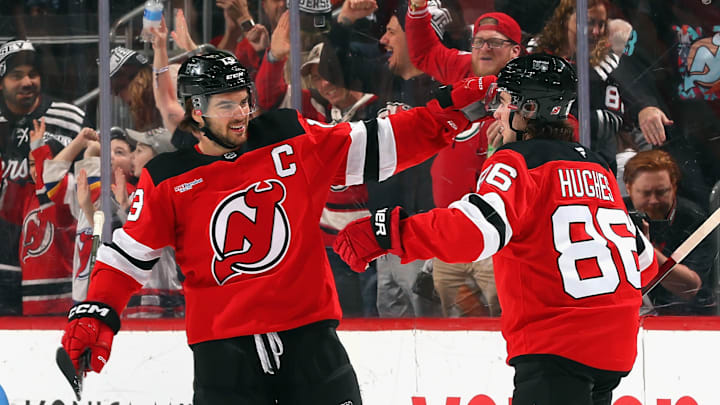Over the years, there's been plenty of debate as to whether the New Jersey Devils, who, of course, play in Newark, are an attractive free agent destination for top players around the NHL.
Based on some new research put together by Dom Luszczyszyn of The Athletic, we may have finally found our answer.
According to Luszczyszyn's findings and data model, the Devils, on average, have saved $0.3 million on contracts over the last five seasons. This ranks sixth in the NHL, trailing only the Pittsburgh Penguins ($0.4 million), Colorado Avalanche ($0.6 million), Carolina Hurricanes ($0.7 million), Vegas Golden Knights ($0.7 million), and, of course, the Florida Panthers ($1 million).
How much of a discount do 'no-state-tax' teams actually get?
— dom 📈 (@domluszczyszyn) July 10, 2025
A look at the last five years of UFA contracts and one reason why the Panthers get the most out of their tax situation.https://t.co/Cq6UcXki9D pic.twitter.com/yWqqy47oqv
Sidney Crosby's two-year, $17.4 million ($8.7 million AAV) likely plays a big factor for Pittsburgh. The one thing the Devils have in common with everyone else? They're now fully considered a Stanley Cup contender.
The Panthers, as has been discussed ad nauseam, benefit from being a no-income tax state, as well as having been one of the best teams in the NHL for most of the last five seasons, going to three Stanley Cup Finals in a row and winning two of them back-to-back.
As for the Devils? Well, New Jersey isn't a particularly friendly state when it comes to taxes. We have an exit tax, income tax, high property taxes, state inheritance tax, and more generally, a higher cost of living compared to most other states with teams in the NHL.
As Luszczyszyn notes, "a player is taxed in their state of residence, allowing them to take full advantage of any tax breaks. . . on deals north of $5 million, the Panthers have spent $420 million on signing bonuses, 81 percent of the total amount owed."
Effectively, the Panthers are able to bypass their players being taxed in other states by paying the overwhelming majority of the deal up front.
The Devils, as mentioned above, don't have that benefit as one of the harshest states to live in in the United States, so how do they save the money?
Simply put, that comes down to the project Tom Fitzgerald is building with the Devils and how he's been able to sell it.
Many will point to franchise players Jack Hughes, Jesper Bratt, and Nico Hischier all signing for a cap hit of $8 million or less and a true salary (in 2025-26) of $9 million or less. However, the list is only focusing on contracts signed by unrestricted free agents. Bratt, Hughes, and Hischier were all RFAs at the time of their signing.
Defenseman Dougie Hamilton, who chose the Devils when he could've went elsewhere in 2021, has a $9 million cap hit and took a total salary of just $6.3 million in each of his first two seasons in New Jersey. For a more recent example, veteran goalie Jake Allen just re-signed with the Devils on a five-year, $9 million deal that carries a meager $1.8 million annual cap hit.
Signing bonuses in the first three years help, yes, but the talk ahead of the start of free agency on July 1 was about how Allen would be the best and most expensive option on the open market.
Instead, the former Stanley Cup champion's cap hit ranks 49th among NHL goalies out of 69. That's a pretty nice deal.
Fitzgerald and Co. will have their hands full with Luke Hughes and his next contract if they don't already, but if the past (and the numbers) have shown us anything, it's that the Devils are among the NHL's best negotiators.
